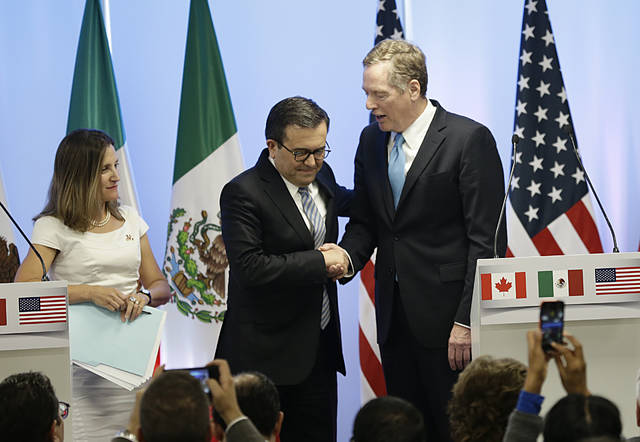Canada, Mexico reject U.S. call for Nafta sunset provision

ASSOCIATED PRESS
Canada’s Foreign Minister Chrystia Freeland, left, Mexico’s Economy Secretary Ildefonso Guajardo Villarreal, center, and U.S. Trade Representative Robert Lighthizer shake hands after posing for a group photo at a press conference regarding the second round of NAFTA renegotiations in Mexico City on Sept. 5.
Canada and Mexico bristled at an idea by the U.S. to include a five-year sunset provision in the North American Free Trade Agreement that would force partners to reconsider the deal or terminate it.
While a Nafta nation can currently exit the pact after giving its partners six months’ notice, Commerce Secretary Wilbur Ross said today it’s unlikely to occur. President Donald Trump has repeatedly threatened to quit Nafta if he can’t get better terms from re-negotiations that began in August.
But by adding a so-called sunset clause, countries would be regularly compelled to take a fresh look at the deal to fix what isn’t working, Ross said.
“The forecasts that had been made at the initiation of Nafta and of the other trade agreements mostly had been wildly optimistic as to the results, and the results have been quite different,” he said at a conference hosted by Politico in Washington. “If there was systematic re-examination after a little experience period, you’d have a forum for trying to fix things that didn’t work out.”
The Canadian and Mexican ambassadors to the U.S., speaking later at the same event, said the provision would create uncertainty for businesses that make long-term investments.
“If every marriage had a five-year sunset clause on it, I think our divorce rate would be a heck of a lot higher,” Canada’s David MacNaughton said. “We can have that discussion, but I really do think it won’t be Mexico and Canada that are pushing back against the secretary, it will be a lot of Americans.”
Don't miss out on what's happening!
Stay in touch with breaking news, as it happens, conveniently in your email inbox. It's FREE!
Mexico’s Geronimo Gutierrez said he agreed with his Canadian counterpart, adding the clause “would probably have very detrimental consequences to the business sector of the United States, Mexico and Canada.”
But Ross said he and U.S. Trade Representative Robert Lighthizer have favored the concept for a long time.
“That’s why we put it forward,” Ross said. “Whether it will be agreed is a whole different question and obviously tied to many, many other issues in Nafta.”
Politico, a news organization, reported earlier on Thursday that Lighthizer was considering plans to propose the idea of a sunset provision.
Ross’s comments come ahead of the third round of Nafta talks, which will take place in Ottawa from Sept. 23-27. The secretary reiterated he wants to wrap up negotiations in the next three to four months, as 2018 elections in the U.S. and Mexico will make it increasingly difficult to come to an agreement.
The Canadian and Mexican envoys also agreed on the need for a dispute resolution mechanism in Nafta. The U.S. in its negotiating objectives published in August before talks began said it would to scrap the so-called Chapter 19 tool, which allows reviews of subsidies and anti-dumping cases by binational panels.
“The one thing that we have said very clearly is that there must be some form of dispute resolution mechanism” in Nafta, MacNaughton said in response to a question about his nation’s red lines in trade negotiations.



